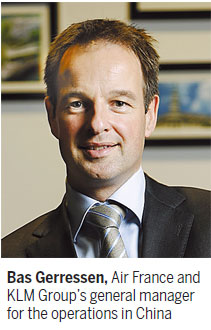In 2013, Air France and KLM Group saw strong growth in the Chinese market.
The number of passengers from China served by the company is estimated to have increased by almost 10 percent in 2013, compared with more than 1 million in 2012.
China is already the group's largest market in Asia by operational revenue, and as Europe's largest airline, it is also a leading carrier between Europe and China.
One of the earliest European carriers to explore the market in the nation's smaller cities, Air France and KLM Group has maintained stable growth on the mainland and operates 77 flights weekly in nine Chinese cities currently in the winter season.
Air France and KLM Group based its first second-tier city route in Chengdu, Sichuan province, as early as in 2006 and the group has confidence in the business growth in China, especially in the second-tier cities.
Statistics from the China Tourism Academy show that China became the largest outbound tourism source country in 2012, and the number of outbound Chinese travelers is estimated to have reached at 98 million person-trips in 2013, with an 18 percent year-on-year growth.
Air France has benefited from the rapid growth of outbound tourism in China because Paris is a favorite destination for Chinese travelers.

"Chinese passengers account for roughly 50 percent of our total passenger volume, and the percentage is expected to keep rising," said Bas Gerressen, Air France and KLM Group's general manager for the operations in China.
Although the group has no plan yet to add new destinations in China in the next year, its international network will attract more Chinese passengers who travel globally, said Gerressen.
About 60 percent of Air France's Chinese passengers transfer from Paris to other regions and countries, he added. South America and Africa, where Air France and KLM Group has a strong network, are the main final destinations for many Chinese passengers, Gerressen said.
Meanwhile, sales on the China-Europe routes are still the priority of Gerressen, who just took over the position in 2013.
"The most important thing is to attract more consumers, no matter the first, business or economic classes," he said.
The expats are still the main consumers of the first and business-class cabins currently, especially on the routes from second-tier cities.
"We are thinking how to attract more Chinese business travelers," said Gerressen.
The increasing students, families and groups for meetings, incentives, conferences and exhibitions are also the carriers' targets, he added.
It is not easy for a carrier to keep market share on the China-Europe routes, as the route is getting more important for European airlines because of the stable passenger sources from the country.
Some carriers have invested a lot into upgrading their facilities to compete with others on the route, and Air France is one of them.
Air France has used an Airbus 380 super-jumbo on the Shanghai-Paris route since September 2013, and the capacity of a flight increased from 309 to 516 seats.
The carrier also has invested into its new premium economic and economy cabins. There are upgraded seats, with more legroom, new seat cushions, more comfortable headrests and wider tray tables.
The first flight with the new Air France cabins will take place in summer 2014 and from then, Air France will equip its 44 Boeing777 airplanes in the long-haul fleet with the new seats and in-flight entertainment systems.
In the beginning of 2014, the carrier will also unveil its future business cabins.
"To support this move upmarket, a new much simpler and more reactive commercial organization was set up in July 2013," said Patrick Alexandre, EVP Commercial, Sales and Marketing Air France-KLM. "These new products and services will constitute major competitive assets in our commercial strategy."
wangwen@chinadaily.com.cn
(China Daily 01/27/2014 page20)


